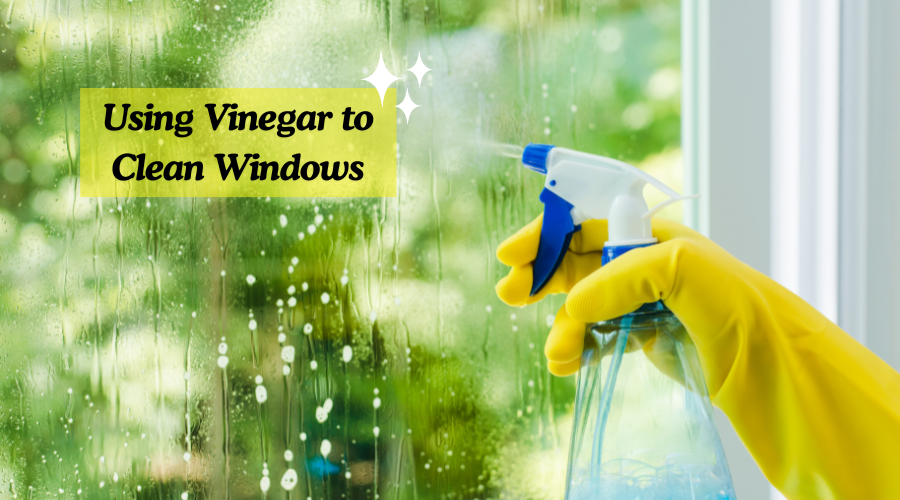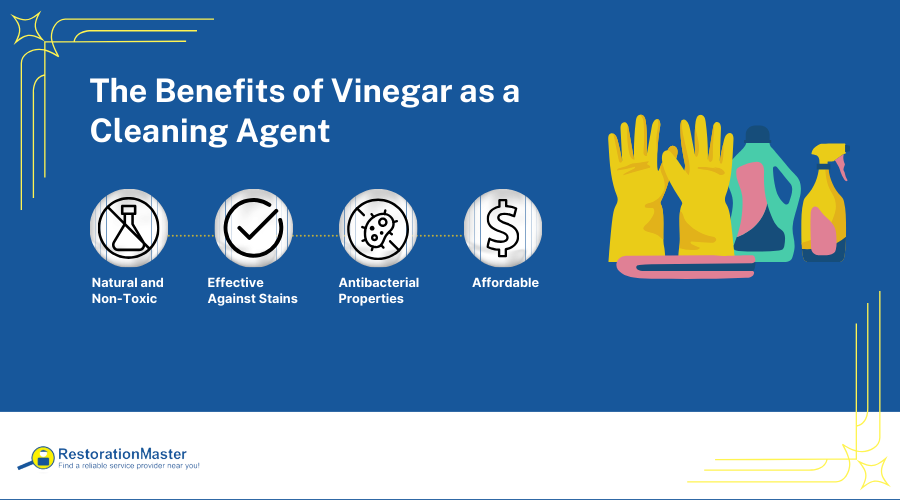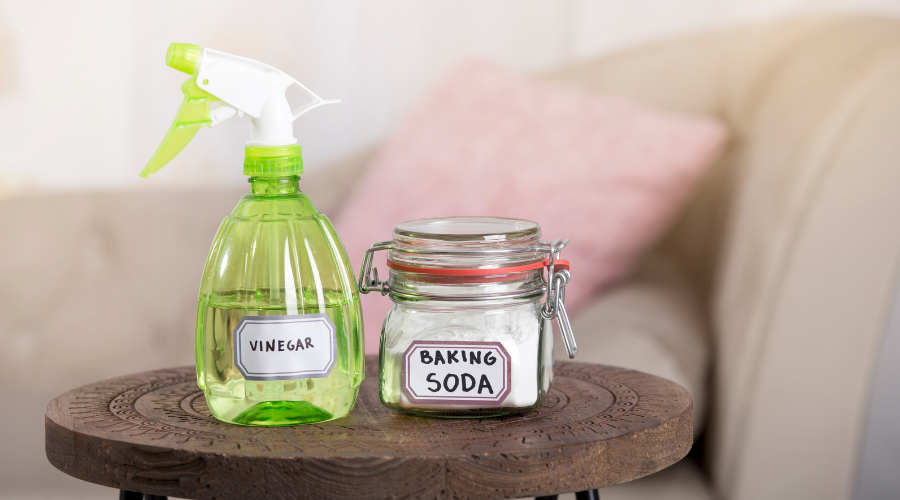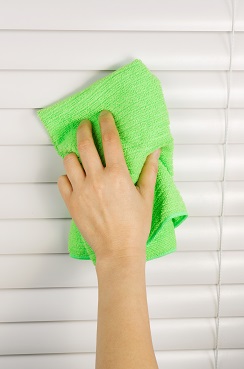How to Clean Windows with Vinegar
Windows are like the eyes of your home, adding to its beauty and vibe. But over time, they collect dust, grime, fingerprints, weather effects, and even moldMold is a type of fungus that grows in damp or humid conditi... More. Cleaning windows isn’t just about looks; it’s essential for keeping them strong and lasting longer. This article aims to explore the reasons that make window cleaning necessary, identify the factors contributing to dirty windows, and examine the effectiveness of vinegar as a natural and cost-effective solutionA solution is a homogeneous mixture of two or more substance... More.

Common Culprits Responsible for Dirty Windows
Windows can accumulate dirt and grime from a multitude of sources, and understanding these factors is essential for effective cleaning and maintenanceMaintenance is the routine care, inspection, and repair of a... More. Some common sources of window dirt include:
- Environmental Elements: Nature brings several challenges to keeping windows clean. Wind carries dust, rain leaves water stains, and pollen settles on surfaces, adding to the overall grime. Car exhaust and smoke contribute pollutants, and air pollutionPollution is the introduction of harmful substances into the... More deposits particles on windows, making them less clean over time.
- Human Interactions: Our everyday actions affect how clean windows stay. Touching windows with dirty hands adds oils and debris, and using window cleaners may leave streaks and residues. In certain areas with hard water, mineral depositsMineral deposits are solid residues left behind when water e... More make the cleaning process more challenging.
- Accumulation of Residues: Over time, windows accumulate various substances, including calcium deposits, salt residues, heavy metals, minerals from hard water, dust, grime, bacteria, and soap scum. This build-up not only affects the clarity of the glass but also poses challenges for effective cleaning.
- Mold and Mildew: MoldMold is a type of fungus that grows in damp or humid conditi... More can grow on windows when there’s too much moisture. This can happen from condensation, high humidityHumidity is the amount of moisture or water vapor present in... More, or water leaks. Windowsills and frames, especially in damp areas, are perfect spots for moldMold is a type of fungus that grows in damp or humid conditi... More. If there’s not enough fresh air, the moisture gets trapped, making it easy for moldMold is a type of fungus that grows in damp or humid conditi... More to develop.
Can I Use Vinegar to Clean Windows?

Vinegar, a common pantry item, can be a strong asset in achieving sparkling clean windows. Here’s why vinegar is an excellent choice for window cleaning:
- Natural and Non-Toxic: Vinegar is a natural cleaning agent that is safe for both you and the environment, making it a preferable alternative to commercial cleaning solutions.
- Effective Against Stains: The acidity of vinegar makes it effective against water stains and mineral depositsMineral deposits are solid residues left behind when water e... More on glass surfaces.
- Antibacterial Properties: Vinegar has antibacterial properties, making it capable of tackling mold and mildew growth on windowsills.
- Affordability: Vinegar is an economical option compared to many commercial window cleaners, providing a cost-effective solutionA solution is a homogeneous mixture of two or more substance... More for routine cleaningRoutine cleaning is the regular cleaning performed to mainta... More.
How to Clean Windows with Vinegar? Step-by-Step Process
- Materials Needed: Gather the following materials – white distilled vinegar, water, a spray bottle, a microfiber cloth or squeegeeA squeegee is a tool with a flat rubber blade used to remove... More, optional dish soap, and a bucket.
- Prepare the Cleaning SolutionA solution is a homogeneous mixture of two or more substance... More: Create a cleaning solutionA solution is a homogeneous mixture of two or more substance... More by mixing equal parts water and white distilled vinegar in a spray bottle. Optionally, enhance it with a few drops of mild dish soap, shaking the bottle thoroughly for a well-blended solutionA solution is a homogeneous mixture of two or more substance... More.
- Dust and Debris Removal: Before applying the solutionA solution is a homogeneous mixture of two or more substance... More, use a dry cloth or duster to remove loose dust and debris from the window surface, preventing streaks caused by residual dirt during the cleaning process.
- Application of Vinegar SolutionA solution is a homogeneous mixture of two or more substance... More: Generously spray the vinegar solutionA solution is a homogeneous mixture of two or more substance... More onto the glass surface, ensuring even coverage. Pay particular attention to stained or stubborn spots, aiding in breaking down grime and dirt.
- Wiping with Cloth or SqueegeeA squeegee is a tool with a flat rubber blade used to remove... More: Use a microfiber cloth or squeegeeA squeegee is a tool with a flat rubber blade used to remove... More in a vertical or horizontal motion to effectively remove dirt and the vinegar solutionA solution is a homogeneous mixture of two or more substance... More, leaving the glass streak-free. If using a squeegeeA squeegee is a tool with a flat rubber blade used to remove... More, start from the top and wipe the blade between each pass.
- Detailing Edges and Frames: Extend the cleaning efforts to the edges and frames of the windows. Dip a cloth into the vinegar solutionA solution is a homogeneous mixture of two or more substance... More and thoroughly wipe down these areas to eliminate accumulated grime, ensuring a comprehensive clean.
- MoldMold is a type of fungus that grows in damp or humid conditi... More Removal: For mold-infested areas, mix undiluted white distilled vinegar with water in a 1:1 ratio. Spray the solutionA solution is a homogeneous mixture of two or more substance... More onto mold-affected areas, let it sit for at least 10 minutes, then scrub with a brush or spongeA sponge is a porous material used to absorb liquids or clea... More, and wipe the surface clean with a damp cloth. Repeat if necessary.
- DryingDrying is the process of removing moisture from materials, s... More and Polishing: Allow the windows to air dry or expedite the process with a clean, dry microfiber cloth, ensuring a crystal-clear finish and preventing water spots.
5 Ways to Use Vinegar for Window Cleaning

Vinegar is a superb choice that can be experimented with various mixes to effectively clean windows. Here’s how you can use vinegar in different combinations:
- Vinegar and Baking Soda: Create a paste by mixing vinegar and baking soda. Apply this mixture to stubborn stains or heavily soiled areas for a deep cleaning effect.
- Vinegar and Lemon Juice: The acidity of lemon juice complements the cleaning properties of vinegar. This combination is particularly effective against hard water stains.
- Vinegar and Cornstarch: For a streak-free shine, add cornstarch to your vinegar solutionA solution is a homogeneous mixture of two or more substance... More. This mixture is ideal for achieving a professional-looking finish on glass surfaces.
- Vinegar and Rubbing Alcohol: Combining vinegar with rubbing alcohol creates a solutionA solution is a homogeneous mixture of two or more substance... More that evaporates quickly, leaving windows sparkling clean without streaks.
- Vinegar, Dish Soap and Essential Oils: For outdoor windows, try mixing vinegar, dish soap, and a bit of essential oils. The added oils not only make it smell nice but also increase the cleaning strength, giving your window cleaning a pleasant and refreshing twist.
How to Prevent Mold on Windows?
To cut down on condensation and keep moldMold is a type of fungus that grows in damp or humid conditi... More at bay, it’s a good idea to take a few proactive steps.
- Start by making sure your window sills stay clean – dust, dirt, and hair can turn into a moldMold is a type of fungus that grows in damp or humid conditi... More buffet if left unchecked.
- Wipe down those sills regularly to discourage any moldMold is a type of fungus that grows in damp or humid conditi... More from setting up shop.
- Check that your windows have snug seals to keep water out; having good-quality windows goes a long way in keeping moldMold is a type of fungus that grows in damp or humid conditi... More away.
- Keep window panes, tracks, and frames free of dust and moisture to deprive moldMold is a type of fungus that grows in damp or humid conditi... More of its favorite snacks.
- Consider using mildew-resistant paint, which not only has the FDA stamp of approval but also provides lasting protection against moldMold is a type of fungus that grows in damp or humid conditi... More.
- Don’t forget about your gutters and downspouts – make sure they’re in good shape to help prevent moldMold is a type of fungus that grows in damp or humid conditi... More.
- Lastly, make sure water around your house drains away properly to avoid indoor moisture problems.
These simple actions can really make a difference in reducing condensation and keeping your living space healthy and mold-free.
If you have tried various cleaning techniques and notice moldMold is a type of fungus that grows in damp or humid conditi... More growth around your windows, reaching out to a professional mold remediation company may be necessary. These businesses have dedicated professionals who are committed to delivering comprehensive services that not only restore the cleanliness of your windows, but also ensure a mold-free environment. Whether you are dealing with scratchy windows or visible moldMold is a type of fungus that grows in damp or humid conditi... More growth, professionals will use advanced techniques and cutting-edge technology to provide effective results.












